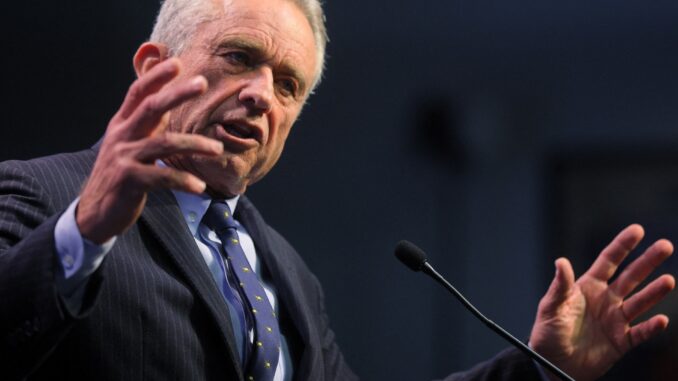
In a bold move aligning with the Trump administration’s skepticism toward renewable energy, Health and Human Services Secretary Robert F. Kennedy Jr. has directed the Centers for Disease Control and Prevention (CDC) to investigate the potential harms posed by offshore wind farms.
This directive, issued through the Department of Health and Human Services (HHS), specifically tasks the CDC’s National Institute for Occupational Safety and Health (NIOSH) with examining the impacts on fishing businesses, highlighting economic threats to coastal communities reliant on marine industries.
Kennedy, known for his environmental activism and now serving in a key health role, personally met with NIOSH Director John Howard to push this initiative forward.
He recommended specific experts for consultation, aiming to wrap up the research within a couple of months. This comes amid broader efforts by President Donald Trump to curb offshore wind development, a technology Trump has repeatedly criticized for its alleged inefficiencies and environmental drawbacks.While the CDC’s focus is on harms to humanity—particularly the livelihoods of fishermen—the conversation around offshore wind farms extends to significant wildlife impacts, which indirectly affect human communities through ecosystem disruption. Discussions on platforms like Energy News Beat have long highlighted these concerns, emphasizing how massive turbine installations threaten marine life and biodiversity.
Economic Harms to Fishing Communities
Offshore wind projects, with their sprawling underwater cables and turbine foundations, are accused of disrupting traditional fishing grounds. Fishermen report reduced catches and increased operational risks due to construction zones and electromagnetic fields from cables, which may disorient fish species.
The Trump administration’s pushback, including this CDC study, underscores fears that these developments could devastate local economies along the U.S. coasts, from New England to the Gulf.
Proponents of fossil fuels and nuclear energy argue that such renewables come at too high a cost to working-class industries, potentially leading to job losses and higher food prices.
Devastating Effects on Wildlife
Beyond direct human impacts, offshore wind farms have drawn criticism for their toll on wildlife, as detailed in various analyses. Marine mammals, such as whales and dolphins, face heightened risks from construction noise, which can cause hearing damage, behavioral changes, and even strandings.
Advocates for ocean conservation warn that the industrialization of vast ocean areas could irreversibly harm ecosystems, pushing for protections against unchecked expansion.
Bird populations are another major concern. Migratory species along coastal routes, including those on the Texas Gulf Coast, are being decimated by turbine blades, leading to significant population declines.
Critics, echoing Warren Buffett’s pragmatic view on wind energy’s viability only with subsidies, point out that these projects often rely on unsubstantiated claims about minimal environmental impact while ignoring evidence of wildlife harm.
In the UK and elsewhere, similar opposition arises from health concerns tied to noise pollution from onshore and offshore turbines, which can affect nearby residents and wildlife alike.
Low-frequency vibrations travel far underwater, potentially disrupting fish migration patterns and the food chain that supports both wildlife and human fisheries.
Broader Implications for Energy Policy
This CDC directive signals a potential shift in how the U.S. approaches clean energy under the current administration. By framing offshore wind as a public health issue, RFK Jr. and HHS are challenging the narrative that renewables are unequivocally beneficial.
Skeptics argue that alternatives like natural gas offer reliable power with fewer ecological disruptions, while wind’s intermittency and high costs—subsidized by taxpayers—warrant closer scrutiny.
As the study progresses, it could influence permitting processes for new projects, delaying Biden-era initiatives and bolstering domestic energy independence through traditional sources. Energy News Beat will continue monitoring this development, advocating for balanced reporting on the real costs of the green transition.
Got Questions on investing in oil and gas?
ENB Top News
ENB
Energy Dashboard
ENB Podcast
ENB Substack



